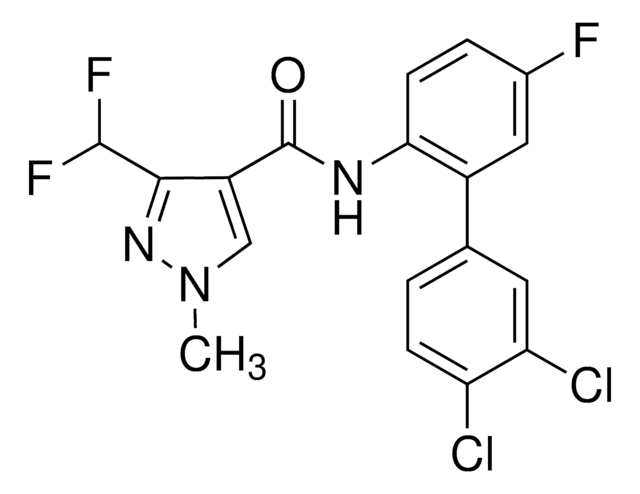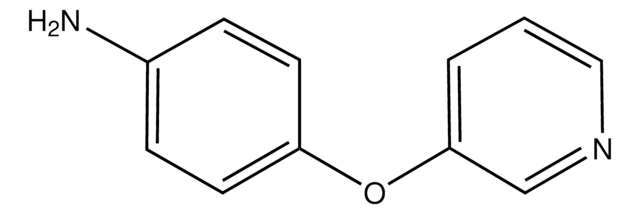CRM01345
Fluopyram
certified reference material, TraceCERT®, Manufactured by: Sigma-Aldrich Production GmbH, Switzerland
Sinónimos:
N-[2-[3-Chloro-5-(trifluoromethyl)-2-pyridinyl]ethyl]-2-(trifluoromethyl)benzamide, N-{2-[3-Chloro-5-(trifluoromethyl)-2-pyridyl]ethyl}-α,α,α-trifluoro-o-toluamide
About This Item
Productos recomendados
grade
certified reference material
TraceCERT®
Quality Level
product line
TraceCERT®
form
solid
shelf life
limited shelf life, expiry date on the label
manufacturer/tradename
Manufactured by: Sigma-Aldrich Production GmbH, Switzerland
SMILES string
FC(F)(F)c1cnc(CCNC(=O)c2ccccc2C(F)(F)F)c(Cl)c1
InChI
1S/C16H11ClF6N2O/c17-12-7-9(15(18,19)20)8-25-13(12)5-6-24-14(26)10-3-1-2-4-11(10)16(21,22)23/h1-4,7-8H,5-6H2,(H,24,26)
InChI key
KVDJTXBXMWJJEF-UHFFFAOYSA-N
¿Está buscando productos similares? Visita Guía de comparación de productos
General description
Certified content by quantitative NMR incl. uncertainty and expiry date are given on the certificate.
Download your certificate at: http://www.sigma-aldrich.com
Fluopyram belongs to the class of succinate dehydrogenase inhibitor (SDHI) fungicides that are also used as a nematicide. It binds to complex II and blocks the mitochondrial electron transport chain, a fundamental component of the Krebs cycle. It is used to control grey mold, white mold (sclerotinia), and powdery mildew in crops such as table grapes, pome fruit, stone fruits, and vegetables, in addition to being used as a seed treatment for the control of nematodes. It is a broad-spectrum systemic fungicide that is absorbed by plant roots and leaves and distributed throughout the plant.
Fluopyram was approved on 1st February 2014 under the Commission Implementing Regulation (EU) No 802/20133 as per Regulation (EC) No 1107/20094 as revised by the Commission Implementing Regulations (EU) No 540/20115 and 541/201. Maximum residue levels (MRLs) for fluopyram have been set according to Reg (EU) 2021/1807 in various products of plant and animal origin from 0.01 to 60 mg/kg. Fluopyram has to be monitored in the Multiannual Control Programmes for Pesticides Residues (MACP), run within the EU and EFTA in/on products of plant origin.
application
Fluopyram CRM may also find its use as described below:
- Method development for analyzing the succinate-dehydrogenase-inhibitor fungicide residue levels in vegetable and fruit samples by liquid chromatography-tandem mass spectrometry
- Development and validation of monoclonal antibody-based immunoassays to analyze fluopyram residues in food samples
- Simultaneous estimation of fluopyram and tebuconazole in watermelon and soil samples using QuEChERS and GC-MS based method
- Determination of fluopyram, flupyradifurone, and indaziflam in date fruit, pistachio, and soil samples by ultra-high performance liquid chromatography with tandem mass spectrometry(UHPLC-MS)
- Develop and validate a method based on QuEChERS and UHPLC-Orbitrap-MS to determine fluopyram and its metabolites in cherry tomato and cucumber
Legal Information
hcodes
pcodes
Hazard Classifications
Aquatic Chronic 2
Storage Class
11 - Combustible Solids
wgk_germany
WGK 2
flash_point_f
Not applicable
flash_point_c
Not applicable
Choose from one of the most recent versions:
Certificados de análisis (COA)
Don't see the Right Version?
If you require a particular version, you can look up a specific certificate by the Lot or Batch number.
¿Ya tiene este producto?
Encuentre la documentación para los productos que ha comprado recientemente en la Biblioteca de documentos.
Nuestro equipo de científicos tiene experiencia en todas las áreas de investigación: Ciencias de la vida, Ciencia de los materiales, Síntesis química, Cromatografía, Analítica y muchas otras.
Póngase en contacto con el Servicio técnico








